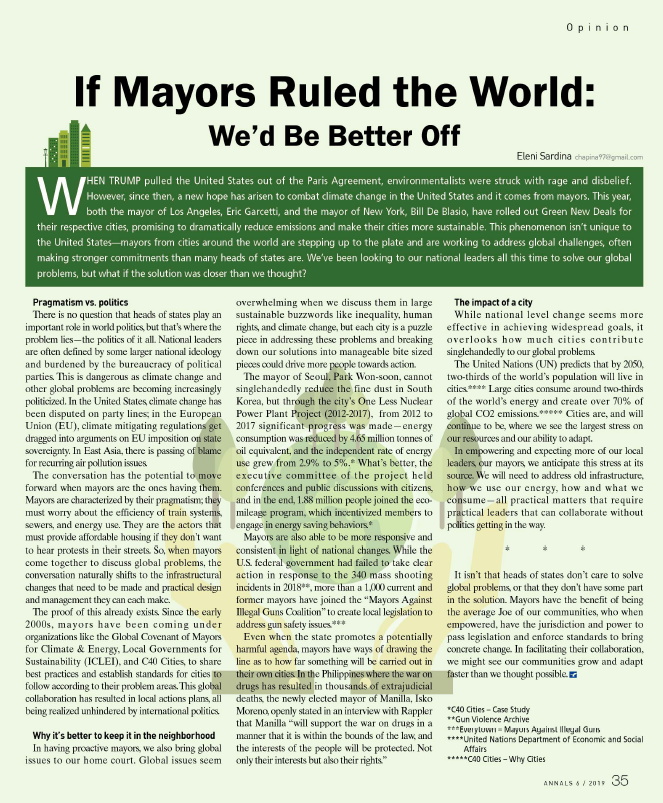
WHEN TRUMP pulled the United States out of the Paris Agreement, environmentalists were struck with rage and disbelief. However, since then, a new hope has arisen to combat climate change in the United States and it comes from mayors. This year, both the mayor of Los Angeles, Eric Garcetti, and the mayor of New York, Bill De Blasio, have rolled out Green New Deals for their respective cities, promising to dramatically reduce emissions and make their cities more sustainable. This phenomenon isn’t unique to the United States— mayors from cities around the world are stepping up to the plate and are working to address global challenges, often making stronger commitments than many heads of states are. We’ve been looking to our national leaders all this time to solve our global problems, but what if the solution was closer than we thought?
Pragmatism vs. politics
There is no question that heads of states play an important role in world politics, but that’s where the problem lies— the politics of it all. National leaders are often defined by some larger national ideology and burdened by the bureaucracy of political parties. This is dangerous as climate change and other global problems are becoming increasingly politicized. In the United States, climate change has been disputed on party lines; in the European Union (EU), climate mitigating regulations get dragged into arguments on EU imposition on state sovereignty. In East Asia, there is passing of blame for recurring air pollution issues.
The conversation has the potential to move forward when mayors are the ones having them. Mayors are characterized by their pragmatism; they must worry about the efficiency of train systems, sewers, and energy use. They are the actors that must provide affordable housing if they don’t want to hear protests in their streets. So, when mayors come together to discuss global problems, the conversation naturally shifts to the infrastructural changes that need to be made and practical design and management they can each make.
The proof of this already exists. Since the early 2000s, mayors have been coming under organizations like the Global Covenant of Mayors for Climate & Energy, Local Governments for Sustainability (ICLEI), and C40 Cities, to share best practices and establish standards for cities to follow according to their problem areas. This global collaboration has resulted in local actions plans, all being realized unhindered by international politics.
Why it’s better to keep it in the neighborhood
In having proactive mayors, we also bring global issues to our home court. Global issues seem overwhelming when we discuss them in large sustainable buzzwords like inequality, human rights, and climate change, but each city is a puzzle piece in addressing these problems and breaking down our solutions into manageable bite sized pieces could drive more people towards action.
The mayor of Seoul, Park Won-soon, cannot singlehandedly reduce the fine dust in South Korea, but through the city’s One Less Nuclear Power Plant Project (2012-2017), from 2012 to 2017 significant progress was made— energy consumption was reduced by 4.65 million tonnes of oil equivalent, and the independent rate of energy use grew from 2.9% to 5%.* What’s better, the executive committee of the project held conferences and public discussions with citizens, and in the end, 1.88 million people joined the eco-mileage program, which incentivized members to engage in energy saving behaviors.*
Mayors are also able to be more responsive and consistent in light of national changes. While the U.S. federal government had failed to take clear action in response to the 340 mass shooting incidents in 2018**, more than a 1,000 current and former mayors have joined the “Mayors Against Illegal Guns Coalition” to create local legislation to address gun safety issues.***
Even when the state promotes a potentially harmful agenda, mayors have ways of drawing the line as to how far something will be carried out in their own cities. In the Philippines where the war on drugs has resulted in thousands of extrajudicial deaths, the newly elected mayor of Manilla, Isko Moreno, openly stated in an interview with Rappler that Manilla “will support the war on drugs in a manner that it is within the bounds of the law, and the interests of the people will be protected. Not only their interests but also their rights.”
The impact of a city
While national level change seems more effective in achieving widespread goals, it overlooks how much cities contribute singlehandedly to our global problems.
The United Nations (UN) predicts that by 2050, two-thirds of the world’s population will live in cities.**** Large cities consume around two-thirds of the world's energy and create over 70% of global CO2 emissions.***** Cities are, and will continue to be, where we see the largest stress on our resources and our ability to adapt.
In empowering and expecting more of our local leaders, our mayors, we anticipate this stress at its source. We will need to address old infrastructure, how we use our energy, how and what we consume— all practical matters that require practical leaders that can collaborate without politics getting in the way.
* * *
It isn’t that heads of states don’t care to solve global problems, or that they don’t have some part in the solution. Mayors have the benefit of being the average Joe of our communities, who when empowered, have the jurisdiction and power to pass legislation and enforce standards to bring concrete change. In facilitating their collaboration, we might see our communities grow and adapt faster than we thought possible.
Eleni Sardina
chapina97@gmail.com

